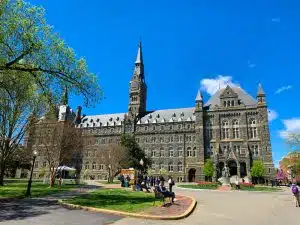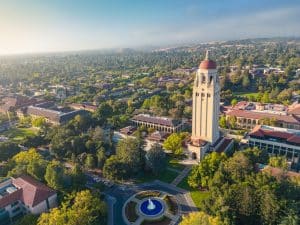Comparing Princeton and Georgetown University
In this article, we’ll be comparing all aspects of Princeton and Georgetown to help you decide which university is the right fit for you. From their histories of academic excellence to their respective research opportunities, we got you covered.
Academic Programs Offered at Princeton and Georgetown
Both universities boast a wide array of academic programs. Princeton has a strong reputation for its undergraduate programs in economics, mathematics, and engineering.
Meanwhile, Georgetown is renowned for its programs in public policy, international relations, and law. Princeton has a smaller student body, which leads to smaller class sizes and a more personalized learning experience.
On the other hand, Georgetown has a more diverse student body, allowing for a wider range of perspectives in the classroom. Ultimately, the choice of academic program will depend on your individual interests and career goals.

Princeton also offers a unique program called the Bridge Year Program, which allows incoming freshmen to defer their enrollment for a year and participate in a service-oriented program abroad.
This program provides students with the opportunity to gain valuable life experiences and cultural immersion before beginning their academic studies at Princeton.
Georgetown, on the other hand, has a strong focus on social justice and community service. The university offers a variety of service-oriented programs and opportunities for students to engage with the local community.
Additionally, Georgetown has a highly regarded School of Foreign Service, which prepares students for careers in international affairs and diplomacy.
Campus Life and Culture at Princeton and Georgetown
When it comes to campus life and culture, both universities have a lot to offer. Princeton has a traditional, Ivy League campus with stunning Gothic architecture. With just over 5,000 undergraduate students, it offers a tight-knit community with a strong residential college system.
Georgetown, on the other hand, is located in the heart of Washington D.C., providing students with plenty of opportunities for internships and cultural experiences outside of campus. Its campus has a unique blend of historic and modern architecture and offers a dynamic social scene.
Additionally, both universities have a wide range of extracurricular activities and clubs for students to get involved in. Princeton has over 300 student organizations, including academic clubs, cultural groups, and sports teams.
Georgetown also has a diverse range of clubs and organizations, with a particular emphasis on social justice and community service. Both universities also offer a variety of events and lectures throughout the year, bringing in speakers from a range of fields and backgrounds.
Admission Requirements for Princeton and Georgetown: What You Need to Know
Admission to both universities is highly competitive. The acceptance rate for Princeton is around 5%, while Georgetown’s is slightly higher at around 16%.
Both schools require strong academic records as well as impressive extracurricular activities, essays, and letters of recommendation. Standardized test scores are also considered, with Princeton requiring the SAT or ACT and Georgetown requiring the SAT or ACT with the writing section.

In addition to the above requirements, Princeton and Georgetown also value demonstrated leadership and community involvement. Applicants who have taken on leadership roles in their schools or communities, or who have volunteered extensively, are viewed favorably by both universities.
Additionally, Princeton and Georgetown both offer need-based financial aid to admitted students, so it is important to submit the necessary financial aid forms along with your application.
Faculty and Staff at Princeton vs. Georgetown: Who Are the Experts?
Both universities have highly regarded faculty members, many of whom are experts in their fields. Princeton has produced a number of Nobel laureates, including physicist Richard Feynman, economist Milton Friedman, and diplomat Woodrow Wilson.
Georgetown’s faculty includes a number of prominent figures, such as former U.S. Secretary of State Madeleine Albright and former U.S. Ambassador to the United Nations Samantha Power.
Additionally, both universities have a diverse range of staff members who contribute to the academic and social environments on campus. Princeton’s staff includes renowned researchers and scholars, as well as dedicated administrators and support staff.
Georgetown’s staff includes experts in fields such as international relations, law, and public policy, as well as professionals in areas such as student affairs and campus ministry.
Location Matters: A Comparison of Princeton and Georgetown’s Surrounding Areas
Princeton is located in a small town in New Jersey, providing a more laid-back and relaxed environment. Georgetown, on the other hand, is located in the bustling city of Washington D.C.
This means that students at Georgetown have easy access to a wide range of cultural experiences, restaurants, entertainment, and internship opportunities.

However, the small-town atmosphere of Princeton offers a tight-knit community where students can easily form close relationships with their peers and professors.
The town also has a strong focus on education, with many events and activities centered around the university. In contrast, the fast-paced environment of Washington D.C. can be overwhelming for some students, and it may be more difficult to form close relationships with classmates and professors due to the larger student body and city distractions.
Extracurricular Activities and Clubs Available at Princeton and Georgetown
Both universities offer a broad range of extracurricular activities and clubs. Princeton has around 300 student organizations, ranging from academic groups to athletic teams and performance groups.
Georgetown has over 200 clubs, including student government, arts and culture groups, sports clubs, and social justice organizations. Both universities place an emphasis on community service and offer numerous opportunities for volunteer work.
Additionally, both Princeton and Georgetown have unique clubs and organizations that cater to specific interests. For example, Princeton has a Quidditch team for Harry Potter fans, a cheese club for foodies, and a ballroom dance team for those who love to dance.
Georgetown has a club dedicated to beekeeping, a club for students interested in fashion, and a club for those who enjoy playing board games. These specialized clubs provide students with the opportunity to connect with others who share their passions and hobbies.
Which University Offers Better Financial Aid Options? Princeton or Georgetown?
Both universities are committed to making their education affordable to qualified students, regardless of their financial background. Princeton meets 100% of demonstrated financial needs for all undergraduate students through grants and work-study programs. Georgetown also offers substantial need-based aid to its students, with over 40% of its undergraduate students receiving financial aid.
However, it is important to note that the financial aid packages offered by both universities may differ based on individual circumstances and factors such as family income, assets, and other financial obligations.
It is recommended that students and their families thoroughly research and compare the financial aid options offered by both universities before making a decision.
Campus Facilities: A Comparison of Housing, Dining, Libraries, and Recreation Centers at Both Universities
Both universities have state-of-the-art facilities for their students. Princeton has a beautiful campus with facilities that include art galleries, a performing arts center, and recreation centers.
Georgetown has a modern fitness center, sprawling library systems, and a variety of dining options both on and off campus. While both universities offer excellent facilities, the choice will depend on your personal preferences and individual needs.
When it comes to housing, Princeton offers a variety of options including traditional dormitories, suites, and apartments. The dormitories are located in close proximity to academic buildings, making it easy for students to get to class.

Georgetown also offers a range of housing options, including traditional dormitories, apartments, and townhouses. The townhouses are particularly popular among upperclassmen who want more independence and privacy.
Both universities have extensive libraries that offer a wealth of resources for students. Princeton’s Firestone Library is one of the largest open-stack libraries in the world, with over 70 miles of shelving.
Georgetown’s Lauinger Library has over 2 million volumes and is known for its strong collections in international affairs, political science, and theology. In addition to their main libraries, both universities have specialized libraries for specific subjects and disciplines.
Student Body Diversity at Princeton vs. Georgetown: Which University is More Inclusive?
Both universities have a diverse student body, with students from different backgrounds, cultures, and countries. Princeton has an undergraduate student body that is 47% White, 27% Asian, 12% Hispanic or Latino, 8% Black or African American, and 6% international.
Meanwhile, Georgetown’s undergraduate student body is 55% White, 14% Hispanic or Latino, 8% Black or African American, 7% Asian, and 6% international. Both universities are committed to creating a diverse and inclusive community.
However, it is important to note that diversity goes beyond just race and ethnicity. Both universities also have a diverse student body in terms of socioeconomic status, religion, sexual orientation, and gender identity.
Princeton has a strong commitment to socioeconomic diversity, with 20% of its undergraduate students receiving Pell Grants. Georgetown also has a diverse student body in terms of religion, with a strong Jesuit Catholic identity but also a significant population of Muslim, Jewish, and other faiths represented on campus. Both universities have resources and support systems in place to ensure that all students feel included and valued.
Career Opportunities for Graduates of Princeton and Georgetown
Both universities have strong career development programs, providing students with resources and support for their future careers. Princeton has a prestigious career services office that offers career advising, job and internship listings, and networking opportunities with alumni.

Georgetown’s career center offers individual career counseling, career fairs, information sessions, and alumni connections. Both universities have successful graduate programs that have helped position their alumni in top organizations around the world.
Princeton and Georgetown also have strong partnerships with various companies and organizations, providing students with opportunities for internships and job placements.
Princeton has partnerships with companies such as Goldman Sachs, Google, and McKinsey & Company, while Georgetown has partnerships with organizations such as the World Bank, the United Nations, and the U.S. Department of State.
Additionally, both universities offer unique programs and resources for students interested in entrepreneurship and innovation. Princeton has the Keller Center for Innovation in Engineering Education, which offers courses, workshops, and funding opportunities for student entrepreneurs.
Georgetown has the Georgetown Entrepreneurship Initiative, which provides resources such as mentorship, funding, and networking opportunities for students interested in starting their own businesses.
Research Opportunities Available for Students at Princeton vs. Georgetown
Both universities offer numerous research opportunities, allowing students to work alongside renowned faculty members and engage in cutting-edge research projects.
Princeton’s research centers focus on areas such as energy, neuroscience, and public policy. Georgetown’s research centers cover topics such as global health, international law, and human rights.
Both universities have a strong commitment to research excellence and provide students with opportunities to pursue their interests.
However, there are some differences in the research opportunities available at Princeton and Georgetown. Princeton has a larger number of research centers and institutes, with a greater emphasis on natural sciences and engineering.
On the other hand, Georgetown has a strong focus on social sciences and humanities research, with centers dedicated to topics such as political economy and cultural studies.
Additionally, Georgetown has a unique advantage in its location in Washington D.C., providing students with access to government agencies, think tanks, and international organizations for research collaborations.
Alumni Networks: Which University Has More Active Alumni?
Both universities have active and successful alumni networks that provide students with valuable connections and resources. Princeton has an extensive alumni network that includes several high-profile individuals in various fields.
Georgetown’s alumni network is equally impressive, with notable individuals such as former President Bill Clinton and Supreme Court Justice Antonin Scalia among its alumni.
Princeton’s alumni network is known for its strong presence in the finance and technology industries. Many of its alumni hold high-level positions in companies such as Goldman Sachs, Google, and Facebook. The university also has a robust mentorship program, where alumni provide guidance and support to current students.
Georgetown’s alumni network, on the other hand, is known for its strong ties to politics and government. Many of its alumni hold positions in the White House, Congress, and various government agencies. The university also has a strong focus on public service, with many alumni working in non-profit organizations and international development.
Conclusion
Both Princeton and Georgetown universities offer exceptional academic programs, faculty, facilities, and career opportunities. However, the choice of which university to attend will ultimately depend on your individual preferences and needs. Take into consideration factors such as location, campus life, and financial aid options to determine which university is the right fit for you.
Segue to AdmissionSight
At AdmissionSight, we firmly uphold the conviction that every student is entitled to the chance to pursue their dreams at their preferred college. Our mission is to equip you with the expert advice and unwavering support you need to secure a place at the schools you aspire to attend.
Don’t let your future hinge on uncertainty. Reach out to AdmissionSight today to arrange a complimentary consultation and embark on the journey toward realizing your dreams. With our expert mentorship and steadfast support, the sky’s the limit.





































